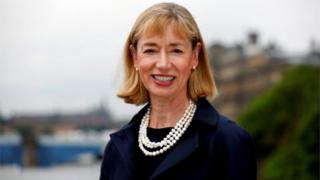 Image copyright
Image copyright
Scottish government
The Scottish government’s permanent secretary, Leslie Evans, will be the first witness at the inquiry
Scotland’s top civil servant is to be questioned by a panel of MSPs over the government’s botched handling of complaints against Alex Salmond.
Permanent Secretary Leslie Evans will be the first witness to appear before the Holyrood committee inquiry.
The former first minister successfully took the government to court over its investigation of harassment complaints.
Mr Salmond called for Ms Evans to quit after the judicial review saw him awarded a £500,000 expenses payout.
The permanent secretary insisted the government inquiry into two historical complaints against Mr Salmond had been let down by a “single procedural flaw”.
She has also been backed by her boss, First Minister Nicola Sturgeon, who is expected to give evidence to the committee in the coming weeks.
The Holyrood inquiry centres on an internal government investigation into two complaints from staff members against Alex Salmond, dating back to when he was in office as first minister of Scotland.
The Court of Session ruled that the investigation had been unlawful, “procedurally unfair” and “tainted with apparent bias” following a judicial review raised by the former SNP leader.
MSPs agreed to hold a special Holyrood inquiry into the collapse of the government case, but it was put on hold for over a year after criminal charges were brought against Mr Salmond – which culminated in him being acquitted of 13 charges of sexual assault at the High Court in Edinburgh in March.
Image copyright
PA Media
Alex Salmond walked free from court in March having been cleared of charges of sexual assault and attempted rape
The group of MSPs, led by Deputy Presiding Officer Linda Fabiani, is to examine the development of the government’s harassment complaints procedure, the application of that procedure to the case of Mr Salmond, and the judicial review case.
They have pledged not to re-investigate any complaints, but members are also to study the “culture” of government under both Mr Salmond and Ms Sturgeon – which has already led to civil service unions voicing concerns about “bullying behaviour” within both administrations.
Mr Salmond’s defence in the criminal trial claimed he was the victim of a political conspiracy – something Ms Sturgeon has dismissed as “a heap of nonsense”.
Me Too movement
Ms Evans will be the first witness to appear before the committee when she gives evidence on Tuesday, with others including Ms Sturgeon and Mr Salmond set to follow. Witnesses will provide testimony under oath.
Ms Fabiani has repeatedly clashed with the permanent secretary over documentation and written evidence being supplied by the government, voicing “frustration and disappointment at the very limited amount of information the Scottish government has chosen to disclose” about the judicial review.
Ms Evans issued an apology “to all involved” following the civil court case in January 2019, but said the investigation had been flawed “in one respect only” – that the investigating officer assigned to the case had had prior contact with the complainers, potentially creating “an impression of partiality”.
Mr Salmond called on the permanent secretary to “consider her position” over the “abject humiliation” the government suffered in court.
Ms Sturgeon insisted that the complaints handling procedure she ordered to be drawn up in the wake of the Me Too movement remained “completely robust” despite the “deeply regrettable” failure in the case of her predecessor.
She has ordered an internal review of “the specific application of this one element of the procedure”, and has also triggered an independent review to decide whether she broke the ministerial code in her dealings with Mr Salmond.